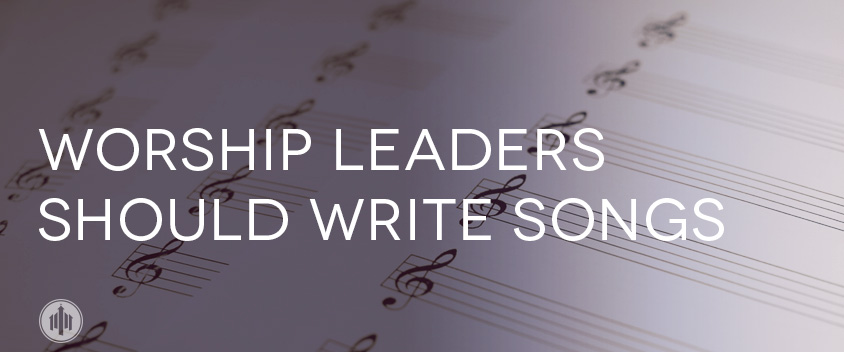
Today we have more worship music available to us than any other time in history. We can find an unlimited amount of worship music online from popular Christian and Worship recording artists. Churches of all sizes are writing, recording and putting out great worship songs. Not to mention all the great indie artists out there who write and record worship music as well. In a time when we have so much music to choose from, why should we as worship leaders write original music? I mean, surely there’s a song already out there that tackles the topic my pastor is preaching next week? Surely there is already a great upbeat worship song to open our worship service with in 2 weeks, right? The answer to those questions is most likely “yes”. But in this post I am going to discuss why I feel it is important for us as worship leaders to continue to write for the local church and why we should also develop writers within our congregations and ministries.
In the book of I Chronicles we are getting towards the end of King David’s reign. He is preparing for the building of the temple (although his son Solomon would be the one to build it) and dividing up responsibilities for the tribes of Israel. In chapter 25 David sets apart some men for the job of singing and leading songs. Among those men are Asaph and his sons. So basically, Asaph has been set apart by King David as a worship leader.
If we fast forward to the book of Psalms we see that Psalms like 50, 73, 75 and 77 were all written by Asaph. So not only was he one of King David’s chief musicians but he also wrote songs for the people to sing and worship God. I think that is an important lesson for worship leaders today. Sure, times were different. They couldn’t hop on iTunes, worshiptogether.com or praisecharts.com and download the latest and greatest worship songs. The Israelites needed people to write songs to sing to God. But, as with most of the Psalms, they are written from such a personal place. They are written to celebrate God, who He is and what He had done for the Israelite people. They were also written to cry out to God in difficult times. This is the lesson I think worship leaders today can learn from I Chronicles 25.
There’s no doubt that we can find a great worship song that will fit just about any theme we need. And there’s nothing wrong with that. But, there’s something special about a song that is written from within a local church community specifically for that community of people. Maybe God is doing something great within a church and a song of celebration is what is needed. Or, maybe a church is going through a difficult time and a song about trusting in God or God being our hope and our refuge is just what our congregation needs.
This has been the case with the church where I lead worship. I have been the worship pastor at Delaware Christian Church in Delaware, OH for 9 years. Our Senior Pastor has been here for about 14 years. In January he had a serious injury to his esophagus which required 2 very serious surgeries and it almost cost him his life. He was out of action for about 7 weeks. A few months later, a 31 year old mom of 3 passed away suddenly and unexpectedly from a pulmonary embolism. Within the last couple weeks of when this post was written, a 19 year old college student was diagnosed with a rare form of childhood cancer that started in the bone in her leg and spread to her lungs and it is life threatening. These are just a few of the major health issues people from within our congregation have had this year. It’s been an extremely emotional year. As a worship leader, how do you respond in these types of circumstances? What encouragement can we provide in such dark and discouraging times? I believe one of the best things we can do is write. Write from your heart and how you are feeling about what is happening in the life of your church. Write from what God is speaking to you through His Word about the circumstances your church is facing. Write to encourage others in your congregation who are chasing the same vision of reaching your community for Christ.
Some may be thinking, “I’m not really a writer.” And that’s okay. Not all worship leaders have to write. But, as a worship leader you probably have some musical ability. Maybe there is someone in your congregation who writes poetry or lyrics. Encourage them and work with them by adding music and melodies to the words and lyrics they write. Or, maybe you want to write but have never been able to, or feel like you don’t have the time. Pray about it. Ask God to help you free up the time and to give you words and melodies that will encourage your congregation.
Remember, no one knows your congregation like you do. No one knows better what your church is facing or celebrating which means no one can write a song specifically for your congregation like you can. Use men like David, Asaph, Korah and others who were set apart as worship leaders. Write from your heart, write for your congregation and most importantly, write for the glory of God.

